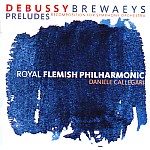You can look at this two-disc set in two ways: either as an attempt at an orchestral realization of Debussy’s preludes in his own style, in which case it is less than satisfactory, or as a colorful arrangement of great music using the full resources of modern scoring. In fact, there have been many attempts to orchestrate this music, and the most successful is Niels Rosing-Schow’s on Jade, imaginatively re-thinking the originals for a carefully chosen chamber ensemble (in 14 of the preludes) consisting of flutes, clarinets, bassoon, trumpet, harp, and string trio. The reality is that there’s much more to Debussy’s symphonic writing than arranger Luc Brewaeys’ suspended cymbals, prominent harps, and excesses of delicate filigree.
For example, the clarinets that open Voiles sound wholly characteristic–but those downward violin glissandos backing the main theme? Definitely not. Similarly, the climaxes of Ce qu’a vu le vent d’ouest are entirely too apocalyptic, if exciting enough on their own. Nor do the harp and celesta that launch La cathédrale engloutie convince (Stokowski’s orchestration is both more atmospheric and appropriately dark, at least at the beginning of the piece). That said, Brewaeys shows no small amount of skillful scoring in a vivid if somewhat generic modern style.
The performances are impressively committed, the engineering aptly detailed and sonorous, and of course the music is great no matter what. On that basis, if you like Debussy’s preludes, you’ll probably enjoy this a great deal, and I can recommend the set accordingly. Even if you don’t like Brewaeys’ work, it will get you thinking, and that’s part of the fun. Idiomatic or not, it’s undeniably entertaining.
































